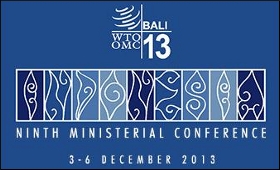|

|
Clear Indian imprint & win at Bali global trade talks
|
|

|
|
| Top Stories |
 |
|
|
|
Arvind Padmanabhan | 07 Dec, 2013
The landmark trade reform deal reached Saturday at Nusa Dua on the Indonesian resort island of Bali leaves a distinct Indian imprint in ensuring that the rights of an emerging economy in addressing its food security concerns cannot be sidestepped just to show some movement forward for a rule-based global commerce.
At the core of the make-or-break deal, clinched after four days of hectic parleys and beyond among the trade ministers of 159 member countries of the World Trade Organisation (WTO), is the right to overshoot the agreed cap on food subsidy and stockpiling to feed the poor.
The rich nations, led vociferously by the US and European Union, put forth what is called a peace clause permitting developing countries to overshoot their food subsidy cap of 10 percent of nation income - but for a maximum period of four years.
This was unacceptable to India till the very end.
Commerce Minister Anand Sharma who led the Indian side would just not relent, even as he was all but branded a deal-breaker and some other emerging countries began to relent during their parleys, notably with the US, on the margins of the Ministerial Meeting.
In fact, according to some interlocutors, Sharma kept Prime Minister Manmohan Singh informed at each stage through the negotiations - sometimes quite late into the night - and he had his boss' full backing till the very end.
The other side had to relent. Once it became clear that the final outcome was in India's favour an informal cabinet approval, too, was sought when it met in Parliament House to condole the death of Nelson Mandela.
There were some other frustrating moments when Cuba said no to the proposal. This could also have killed the pact since under the WTO charter all decisions have to be consensus-based - with no room for majority decisions.
But Washington managed to convince Havana with what diplomats says was a side deal.
Thus, for the first time since the Geneva-headquartered WTO came into being on Jan 1, 2005 it could claim success for a trade-reform deal that, by some estimates, promises to add some $1 trillion to the global economy and create and create some 21 million jobs, nearly 18 million in developing nations.
"For the first time in its history, the World Trade Organisation has finally delivered," the new WTO Director General Roberto Azevedo told the extended meeting's closing ceremony, barely able to conceal his tears.
"We withstood pressure and didn't blink at all," said Sharma - who was summoned several times by summit chairman and Indonesian Trade Minister Gita Wirjawan to the venue, Bali Nusa Dua Convention Centre, when the deal appeared to be going nowhere. "It was a war of nerves."
Broadly, the impact of the agreement reached in the Balinese island resort on India is on two counts, both favourable to the extent possible. First, on food security. Second, on trade facilitation.
Now, India won't be dragged to the WTO if its food subsidy level exceeds the cap of 10 percent of nation output, nor will it be legally faulted if it resorts to such farmer-friendly measures as minimum support price for procurement of grain and lentils.
Politically, the much-touted food security law - which the Congress party believes will be a game changer in the upcoming national elections - appears safe from international scrutiny and the poor can be provided subsidised grain, beyond acceptable subsidy level.
On trade facilitation, Indian exporters will stand to gain from easier port clearances and lower transaction costs as rich nations, especially the EU members, will have to ease their tough rules, which had earned them the epithet "Fortress Europe".
For this, the Bali Ministerial Declaration agrees to the establishment of a preparatory committee on trade facilitation, which will be overseen by the General Council, the second-highest forum of WTO after the Ministerial Conference, to ensure expeditious implementation.
For the record, the current global trade talks - called the Doha Development Round after it was kick-started in the Qatari capital in 2001 - is far from over. Far more contentious issues remain to be revolved.
Yet, Bali was a movement forward. After eight Ministerial Conferences, one each in Singapore, Seattle, Doha, Cancun and Hong Kong, and thrice in Geneva, the 9th one at Nusa Dua has shown WTO can still deliver - and emerging economies can no longer be taken lightly.
|
|
|
| |
|
|
|
|
|
|
|
bali pact
Mahadevan | Sun Dec 22 07:38:53 2013
what are the disadvantages of this pact

|
|
|
|
|
|
|
| |
| Customs Exchange Rates |
| Currency |
Import |
Export |
US Dollar
|
84.35
|
82.60 |
UK Pound
|
106.35
|
102.90 |
Euro
|
92.50
|
89.35 |
| Japanese
Yen |
55.05 |
53.40 |
| As on 12 Oct, 2024 |
|
|
| Daily Poll |
 |
 |
| Do you think Indian businesses will be negatively affected by Trump's America First Policy? |
|
|
|
|
|
| Commented Stories |
 |
|
|
|
|
|
| |
|